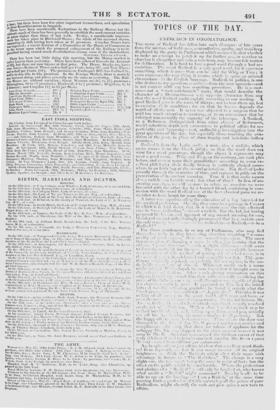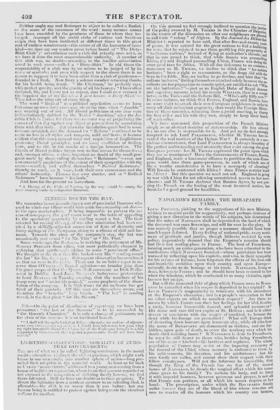TOPICS OF THE DAY.
EXERCISES IN ONOMATOLOGY.
THE name of Radical has fallen into such disrepute of late years from the mixture of feeblemeae contradiction; apathy, and treachery displayed by the party in Parliament which assumes it, that whether to make an a tempt to patch it up for further use, or waether to abandon it altogether and coin a new term may become fair matter for deliberation. It is hard to lose a good, word through a bad as- sociation. The word Radical is it Wiry gona word, for it expresses something, which is more than can be said for Whig or Tory ; it even expresses the very thin.- it means, which is quite an unusual circumstanc in the Enelish language. Radical, in politics' is one who desires to try questions a nallo;.---from the root upwards-and. is not content with any less searching procedure. He is a root- 211011- not a " root-and-branch " man; that would describe the character of 11 Dr.structive-a very opposite character from any that the wonl Radical could explain according to our reading. A good Radical goes to the roots of things ; not to tear them up, but to examine thA. condition ; for on that he knows depends the worth of all the rest. It never was objected to a surgeon that he paid too much attention to anatomy, or to an astronomer that he enlarged unreasonably the capacity of his telescope. A Radical, as a Refbrmer, distinguished from other classes of Reformers, would substitete depth and earnestness in political aflitirs for su- perficiality and hypocrisy-real, untlinchim, investi,ation into the great questions of the day, but especially those totAing the con- dition of the poor, in plaec of sham inquiry and indefinite hollow promises.
Thatica/ is from the Latin rad,e, a root, also a radish; which again comes front the Greek iiii8t$; so that the word does not want for a good parentage, though the object it represents may want a good name. "Whig and Tory, on the contrary, are rank pie- beians, and ceilot name their grandfather: according to some ex- cellent philoloel..:t their family history is suddenly choked some- wlwre ill an 1H,Ii !..,g at the second generatiou. I kit it'adica/ looks. proudly throe 211 the centuries of time, and repo,es in pride on the preservation or its ancient meaning. 't'rue it is that ?ya/ix means also a radish-an humble root ; but what of that ? In lieu of an- swering ourselves, we will venture to relate an anecdote we were favoured with the other day by a learned friend, containing in con- nexion with the word Radical one of the best classical puns WC re- member to IMe heard for some time.
A tutOr NV:1:; IZIlperilitohli!tg the talucation of a boy intended for the medical pren.ssion. Ole day they came to a passage in Cm.sus
in v. Ii it'll it is 1..1,1 dov.al Clat in a certain c.:so the only effectual cure is " esse no.licnlam"-to eat a radish. Ilia the lad, not having
prepared his mid ignorant of any second meaning for es8e, blundered on and unhesitatingly pronoulieed that in a certain ease the only remedy was " - to be, radiculam-a Radieal,-to be a lladierl " For hflose
i);* ,
is in
ill:, iii the the un-
.,1 Whatever credit sueli a mune le• 'en foun11 that it brought none in
\e',e Ittgloomy rumination on this ! t',tntly the • ;!,Ii,:thho of giving . 51. V-. 11 i•i.p.:;•,1 1 1!I 111.2t Ow initial e paitiele; he v, hat the a11,e1 , Privative it was a. and lucre, or lieltons resolved ,e,iintal step he 1 la n, actually -ierity. But ;!at door was
, monies and
; I I )111iMSC for the --ti as ever it was .,:ed the ladliant. career of that cl zed. vocalist .11r. B-m (quasi !,) clear that excellcilt word /?atii- never recover ill its original .I; might alter their name with ..lishes." The change is a very e- the same in point of fact ; but the \Vlicre the professions
• ald only he laughed at, who knows
the happy slammed Ii, con.e1115, unlece;)■- •. sung
truly
As, in ea/ from ii• brightness. advantage .1] slight one, the t . effect on the led,' and pledge, t':L what credit a able to say on 1 pouring forth a -ece:e Radicalism, might el affitirs. ittlenten, in or nut of Parliament, \di() may feel I.. 'i»g ,itunthni rcquiring- It a coin- . wayS (TC'11. The 11101dt ,1 't :1.' • •:1 that the a -shall serve
;1 for the ide instance
neither ought any real Rethrmer to object to be called a Radish on the score of the meanness of the word : many meaner names have been ennobled by the greatness of those to whom they be- louged. Amongst all the social clubs of curious and facetious origin that have been instituted at different times in this great seat of endless wonderment—this centre of all the humours of' man- kind—we dare say our readers never before heard of' The Dirty- Shirt Club" ;* nevertheless such a club did actually once exist, as we have it from the most unquestionable authority. A member of' this club was, no doubt—according to the familiar abbreviation usual in such cases—called a " Dirty-Shirt." In old times the respectability of a club was by no means to be judged of' by its name or symbols; and even with respect to the above there is no reason to suppose it to have been other than a club of gentlemen— founded in a freak. Now fancy a solemn member returning thanks for his health being drunk. " Mr. Cl ain't he probably says, with perfect gravity, and the gravity of' all his hearers, "1 have often declared, Sir, and I care niO to repeat, that I shall ever eccount it the happiest day of' my lie. when I first become; re Dirty ,S'Itiet."— Time takes the sting out of every thing. The word " Radient" as a political appellation seems to have first come up sonic forty years aeo, abeut the time when " Jacobin" was wearing out of' use. All liberal politicians at one time were indiseriminately dubbed by the Tories " Jacobins," ailer the Ja- cobin Club in Paris; ft there wns no surer way or prejudicing the masses of that day Ilgaiw;t eny eliject or person ti an by associating them with that body. ilot when the Revolution-panie had ill some measure subsided, and the deinand " colitintied to be made no less in all styles and tempers, mild and fierce, it became evident that this was a gcemal want and requisition of Englishmen professing liberal principles, and no hasty cfaillition or feeling, born, and to die, in the smoke of' a lbreigu insurrection. The friends of liberal politics began now to find flFnicCS for themselves ; and, amongst others, a doss, impatient no doubt of the small pro- gress made by those calling themselves " Reformers "—even not unwarrantobly suspicious of' the extent of their sympathies with the cause—seceded, and called themselves " Bodied/ Reformers," thereby to mark, es it were, both their own earnestness and the others' insincerity. Planscs run ever shorter, and so " Radical Reformers" have become " Radicals."
And here for the present we leave them.
* A Ilistory of the Ciule oU Lembo, by the way, would be among the moil: amusing works in ;:n thporian literature.



























 Previous page
Previous page